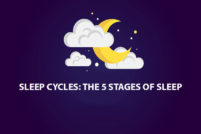Do you find yourself forgetting simple things, like people’s names or stuff you just learned? Forgetfulness can be annoying when you’re trying to learn something, especially if you are a student, and it can be a big time waster. There are many ways to improve your memory, from apps to supplements, but the key to boosting your memory could also lie in your length and quality of sleep.
The Mayo Clinic suggests that adults get at least seven to nine hours of sleep each night and it’s even more for children, so if you are falling short of this target, you might notice that your memory is not at its best.
Studies show that getting more sleep can improve your memory in interesting ways – by helping to create long-term memories, gel or store new information and helping you recall previously forgotten info, among other ways. Keep reading to learn more as we delve into six ways that sleep can improve your memory.
1. Sleep can improve focus
We’ve all experienced how a sleepless night can make it difficult to focus and stay on task the next day. When we are tired, it can be difficult to take in new information and pay attention, let alone remember it the next day.
The National Sleep Foundation explains that when we “lose sleep, it’s harder to focus and pay attention”, which can affect “school performance and job productivity”.
This lack of focus can even be dangerous, especially when driving and it can slow our reaction time, making for “other safety-related risks at work and at home.” A good night’s sleep makes for a mind that is less prone to distraction and if we are less distracted, we are more likely to remember things.
Adequate sleep can also help focus when multitasking, so if this is an issue for you, make sure you are getting enough sleep hours, each and every night.
2. Sleep helps create long-term memories
Scientists have long believed that the process that turns short-term memories into longer, “banked” memories happens during sleep, although they are still unsure exactly how. The regions of the brain where this “banking” process occurs seems to be in the hippocampus and neocortex.
To explain it simply, the hippocampus is responsible for playing the events from the day and the neocortex reviews them and gets them ready to store them for the long term. Scientists are now trying to better understand how the different stages of sleep affect this storage process.
What they do know is that sleep is an important part of this storage process. Research out of MIT’s Center for Neural Circuit Genetics showed that mice that were prevented from replaying their waking experiences during sleep were not able to remember these experiences as well as other mice that did not have this neural pathway interrupted.
So, sleep is not only an important part of our short-term focus but is needed for turning these daily bits of info into long-term stored data.
3. Sleep helps organize and creatively connect stored memories
Sleep is not only an important part of storing new information, but it is also necessary to help organize that information so that we can make new associations and connections to be able to use it at a later date.
One study out of the University of California Berkeley showed that sleep affects memory by generating unusual connections in the brain, in ways that the brain doesn’t seem to think of when it’s awake.
In the experiment, subjects were presented with pairs of six abstract patterns and taught that the pairs should be organized in a specific hierarchy called “premise pairs”. But there was also a hidden order to these pairs that was not taught, that were called “inference pairs” because patients needed to infer their order based on previous information.
Patients that were allowed to have a good night’s sleep before coming back to the testing got 93 percent of these inferences correct, compared to those that were busy all day and did the test 12 hours later in the day, who only got 70 percent correct. This study seems to show that generating new, creative connections between our memory takes time and, more importantly, sleep.
Another study demonstrated how dreaming about a task helped to organize it and make it useful for the next day. In it, volunteers tackled a complex maze and learned how to navigate their way around it. During a break, some test subjects were allowed to nap for 90 minutes and the others were kept awake. When the subjects tackled the maze again, the ones who dreamed about it during their nap did better.
4. Sleep helps gel or store new information
Sleep is also an important part of consolidating and “gelling” information, solidifying its place in our brain for a later date. Not only is sleep important for this “gelling” but wakefulness can even prevent this storage from occurring altogether, because of the new stimuli and information always coming in.
Even a short nap can help with this forming of memories and getting new info to “stick”. In one study, volunteers were asked to memorize the details of 15 cards with pictures of animals and everyday objects. 40 minutes later, they were asked to remember a second set.
The volunteers were split into two groups and one group was allowed to take a 20-minute nap. The group that was allowed to nap was able to recall 85 percent of the cards, whereas the awake group only got 60 percent correct.
5. Sleep doubles the chances of recalling previously forgotten info
Scientists have also discovered that sleeping can double our chances of recalling information that we’ve previously forgotten by making memories sharper and more accessible. In their research, volunteers were split into two groups.
One group was allowed to sleep throughout the night and the other was subjected to 12 hours of wakefulness. Both groups were then asked to remember a series of made-up words, in other words, new information previously unknown to them. As expected, the group who were able to sleep had far better recall than the group that remained awake.
Dr Nicolas Dumay, who led the study out of the University of Exeter, explains that “[s]leep almost doubles our chances of remembering previously unrecalled material. The post-sleep boost in memory accessibility may indicate that some memories are sharpened overnight.
This supports the notion that, while asleep, we actively rehearse information flagged as important. More research is needed into the functional significance of this rehearsal and whether, for instance, it allows memories to be accessible in a wider range of contexts, hence making them more useful.”
6. Sleep is important for optimal brain health which supports good memory
Chronic sleep deprivation can lay the foundation for a whole host of medical problems, including diabetes, high blood pressure and narrowed blood vessels. Experts at Harvard Health explain that “[b]rain cells need a lot of oxygen and sugar, so blood flow problems could affect their ability to work properly.”
They go on to explain that sleep-deprived mice show more deposits in the brain of a protein known as beta-amyloid. In humans, these protein deposits are linked to an increase in dementia and memory problems. So, to give our brains the chance for repair, good blood flow and general good health, it is imperative we get enough sleep, each night.

Tips and Tricks for Sleeping Well to Improve Your Memory
- Take shorter naps – Many people claim they don’t have time for a nap, but it seems that short naps are all that’s needed to access stored memories. Apart from the studies mentioned above, which featured short nap times, one study out of Germany showed that even a six-minute nap helped participants recall a list of 30 memorized words.
- Don’t sleep too long – Just like short naps are all that is needed, some evidence shows that sleeping too long can have the adverse effect when trying to recall previously learned information. This is because people that sleep more than nine or 10 hours per night are often sleeping poorly. So, it is not just the number of hours that is important for memory health but the quality of sleep.
- Make sure your room is dark – Most people sleep best in a dark room. Make sure you have room darkening shades or curtains and don’t sleep with a TV on. Research shows that blue light emitted from devices and TV can disrupt sleep.
- Avoid caffeine later in the day and liquids after dinner – Not only will caffeine keep you awake and make for a disruptive sleep (in which you fall asleep and wake up repeatedly), liquids in general, when consumed late, can keep you up going to the bathroom in the night.
- Don’t eat late at night – Give your body a chance to rest and reset by fasting for the hours after dinner, until breakfast in the morning. People who don’t eat before bed sleep the best as your body doesn’t have to work at digesting food and you won’t have pent up, unnecessary energy.
- Buy a new mattress – How old is your mattress? If you are having trouble sleeping, there may be a connection between the age of your mattress and how well you sleep. Sagging, rips, tears and lack of support can all affect the quality of your sleep and make for restless nights and a day of forgetfulness and lack of focus.





